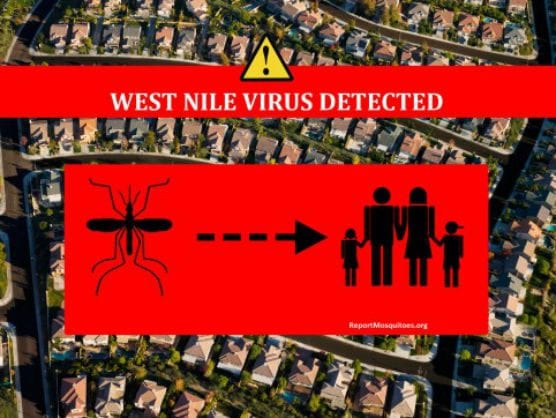The Los Angeles County Department of Public Health has confirmed the first cases of human West Nile virus infection in L.A. County for the 2022 season. Long Beach and Pasadena report cases identified in those cities by their local health departments and are not included in L.A. County reporting.
A total of six cases have been identified, most of whom were hospitalized for their illness in late July and early August. The cases reside in the Antelope Valley, San Fernando Valley and San Gabriel Valley and all are recovering.
“Mosquitos thrive in hot weather and residents should follow simple steps to reduce their risk of exposure to mosquito-borne diseases, such as West Nile virus,” said Muntu Davis, MD, MPH, L.A. County Health Officer. “Simple measures can reduce mosquitos and mosquito bites, like protecting yourself and your family with insect repellent and removing standing water outside your home. West Nile virus can lead to hospitalization or death, and, by taking preventative steps now, residents can better protect themselves against infection and the serious neuro-invasive disease caused by this virus.”
West Nile virus is spread by the bite of an infected mosquito. Symptoms may include fever, headache, nausea, body aches, and a mild skin rash. WNV can affect the brain and spinal cord and result in meningitis, encephalitis, paralysis and even death.
There is no vaccine for West Nile Virus and no treatment to cure the illness once an individual becomes sick.
Adults over the age of 50 years and those with chronic health problems are at higher risk of severe illness if infected. While not all mosquitoes carry this virus, the type of mosquito that spreads this virus is found throughout L.A. County.
Public Health recommends the following actions to reduce the risk of West Nile virus infection:
–Avoid mosquito-infested areas at dawn and dusk.
–Use insect repellant. Use Environmental Protection Agency registered repellents containing DEET, picaridin, IR3535, oil of lemon eucalyptus, para-menthane-diol, or 2-undecanone. When used as directed, EPA-registered insect repellents are proven safe and effective, even for pregnant and breastfeeding women. Find the right insect repellent for you by using EPA’s search tool.
–Cover up. Consider wearing long-sleeved shirts and long pants when you are outdoors, particularly at dawn and dusk in areas where more mosquitoes are present.
–Take steps to control mosquitoes indoors and outdoors.
–Use screens on windows and doors. Check for and repair holes in screens to keep mosquitoes outdoors.
–Stop mosquitoes from laying eggs in or near water. Once a week, empty and scrub, turn over, cover, or throw out items that hold water, such as tires, buckets, planters, toys, pet bowls, flowerpot saucers, rain barrels, or other containers. These are breeding grounds for mosquitos where they lay their eggs.
–Empty and wash birdbaths and wading pools weekly.
–Clean and chlorinate swimming pools; drain water from pool covers.
–Stock garden ponds with mosquitofish (Gambusia affinis), goldfish, Koi or other mosquito-eating fish. These feed on mosquito eggs and larvae.
Public Health continues to document human cases of West Nile Virus every year in L.A. County, at an average of 91 cases per year during the last 5 years. However, the total number of people infected with West Nile Virus each year in L.A. County is much higher as most infected persons do not experience any illness or only mild illness. These cases are neither reported nor recognized as West Nile Virus.
About three-quarters of reported cases have had severe disease and approximately 9% of patients with severe West Nile Virus die from complications. Public Health collaborates with local vector control agencies to target areas for mosquito control activities as well as educate people about how to protect themselves.
Reduction of mosquito breeding sources and protection from mosquito bites are the best ways to prevent West Nile Virus infection.
“This is a reminder that West Nile Virus is active in L.A. County every year and mosquito control is a shared responsibility,” said Leann Verdick, District Manager of the Antelope Valley Mosquito and Vector Control District. “While our technicians check and treat mosquito breeding in public water sources, residents are urged to eliminate standing water on their property and use EPA-registered repellents when mosquitoes are active.”
For more information visit Public Health – West Nile virus.
To find a local vector control district, visit SoCal Mosquitos.
Stagnant swimming pools or “green pools” should be reported to the Public Health Environmental Health Bureau at (626) 430-5200, or to a local vector control agency. Dead birds may be reported by calling (877) 968-2473 or online at West Nile Virus Dead Birds.

Like this:
Like Loading...
Related





 Tweet This
Tweet This Facebook
Facebook Digg This
Digg This Bookmark
Bookmark Stumble
Stumble RSS
RSS





























REAL NAMES ONLY: All posters must use their real individual or business name. This applies equally to Twitter account holders who use a nickname.
0 Comments
You can be the first one to leave a comment.